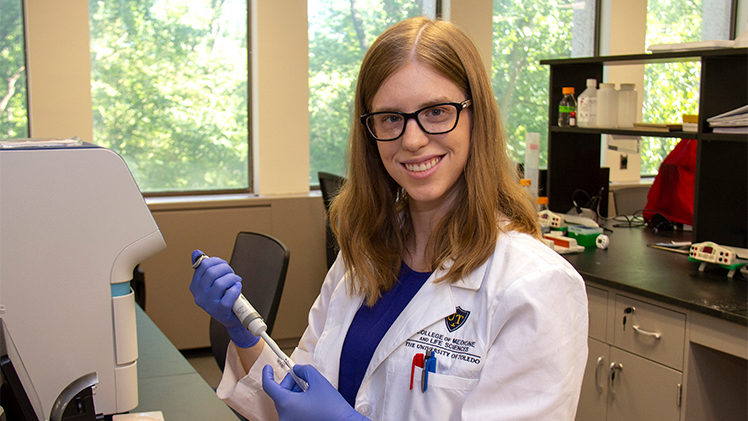Liver cancer is a sneaky disease. In the early stages, it rarely causes symptoms. By the time the cancer is discovered, it has often progressed too far to be effectively treated.
To beat this stealth killer, Rachel Golonka is looking in a seemingly unlikely place — our gut.

Rachel Golonka was recently awarded a Ruth L. Kirschstein National Research Service Award (F31) from the National Cancer Institute, which is a highly competitive fellowship that supports promising doctoral candidates.
Golonka, a doctoral student studying molecular medicine in The University of Toledo College of Medicine and Life Sciences, is researching how bacteria living in our digestive system produce metabolites that may help liver cancer proliferate by tamping down our immune responses.
Specifically, she’s zeroed in on short chain fatty acids and secondary bile acids, both of which are produced in the colon.
“The idea is that these two metabolites are telling the immune system to shut down or be quiet,” she said. “It’s reprogramming which immune cells are recruited to the liver cancer environment. There are fewer cancer killer cells and more immune suppressive regulatory cells, which allows the liver cancer to progress.”
To combat that, Golonka is targeting the bacteria responsible for producing those metabolites using both repurposed drugs and novel pharmacological agents. By inhibiting production of the problematic metabolites, the expected hope is to observe more cancer-killing immune cells and less liver cancer itself.
She was recently awarded a Ruth L. Kirschstein National Research Service Award (F31) from the National Cancer Institute. The highly competitive fellowship supports promising doctoral candidates and provides them with a robust, individualized training experience.
Golonka works under the mentorship of Dr. Matam Vijay-Kumar, a professor in the Department of Physiology and Pharmacology. Vijay-Kumar said the link between bacteria in our colon and liver cancer is newly popular but still understudied.
“Not only is she studying why the metabolites promote liver cancer, but she is identifying what potential therapeutics could be applicable in clinics to make life easier for those with liver cancer,” he said. “Her receiving this prestigious award gives insight to her enthusiasm for research and ambition to advance science.”
For Golonka, who scored in the top 1% of all F31 applicants in the National Cancer Institute study section and hopes to stay in academic biomedical research after graduation, the award represents a major personal achievement.
“When it comes to going further in the academia career path, if you can get a predoctoral fellowship during your graduate school years, that’s extremely monumental and a confidence booster,” she said. “I feel very secure about my future.”
Golonka is one of two students in the College of Medicine and Life Sciences to earn the prestigious fellowship in recent months.
Last year, Joshua Breidenbach, a Ph.D. student in the Department of Medical Microbiology and Immunology who is studying how individuals with asthma are affected by the cyanotoxins that get dispersed into the air during harmful algal blooms, received an F31 fellowship from the National Heart, Lung and Blood Institute.